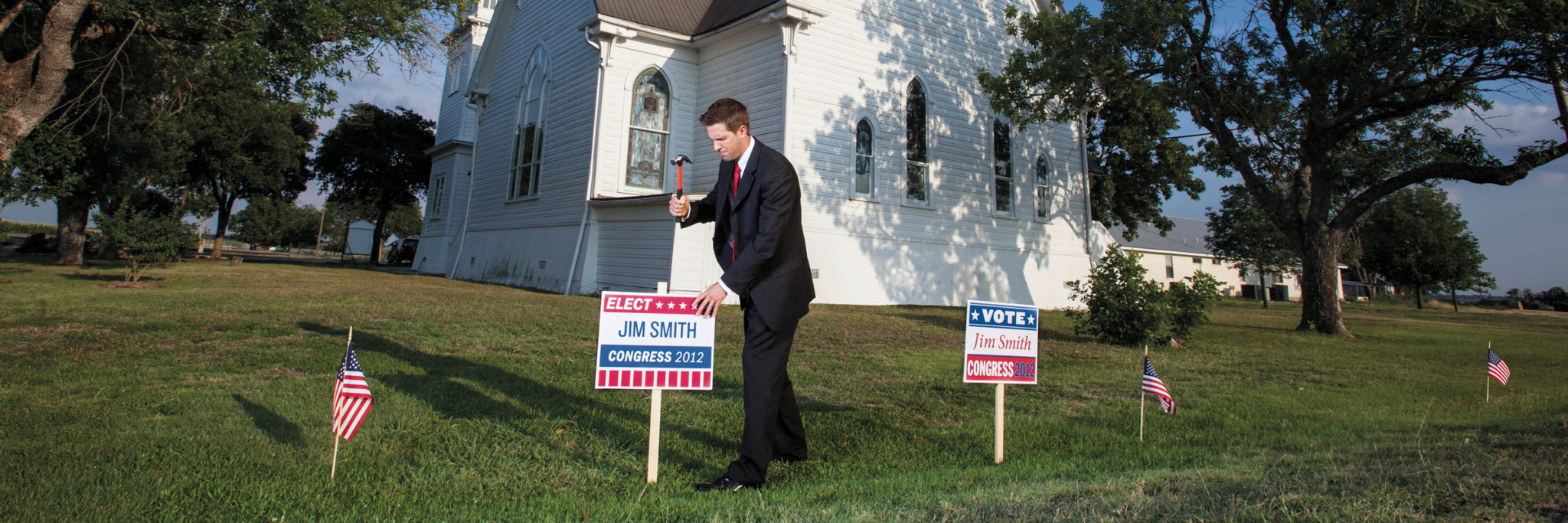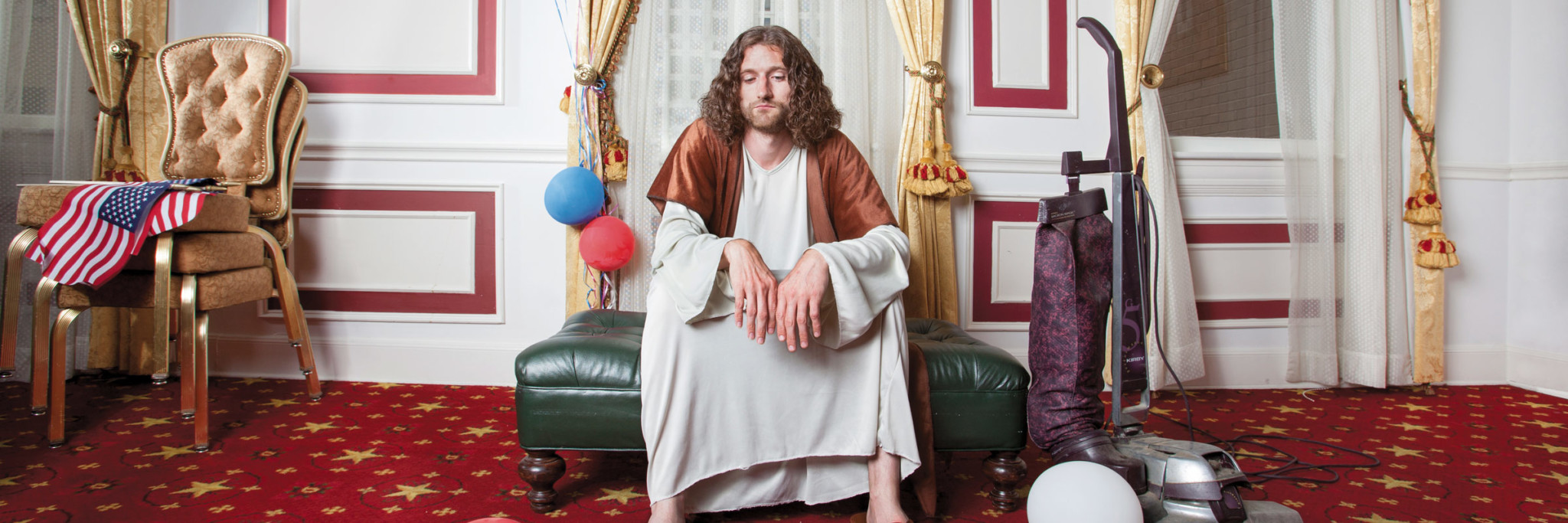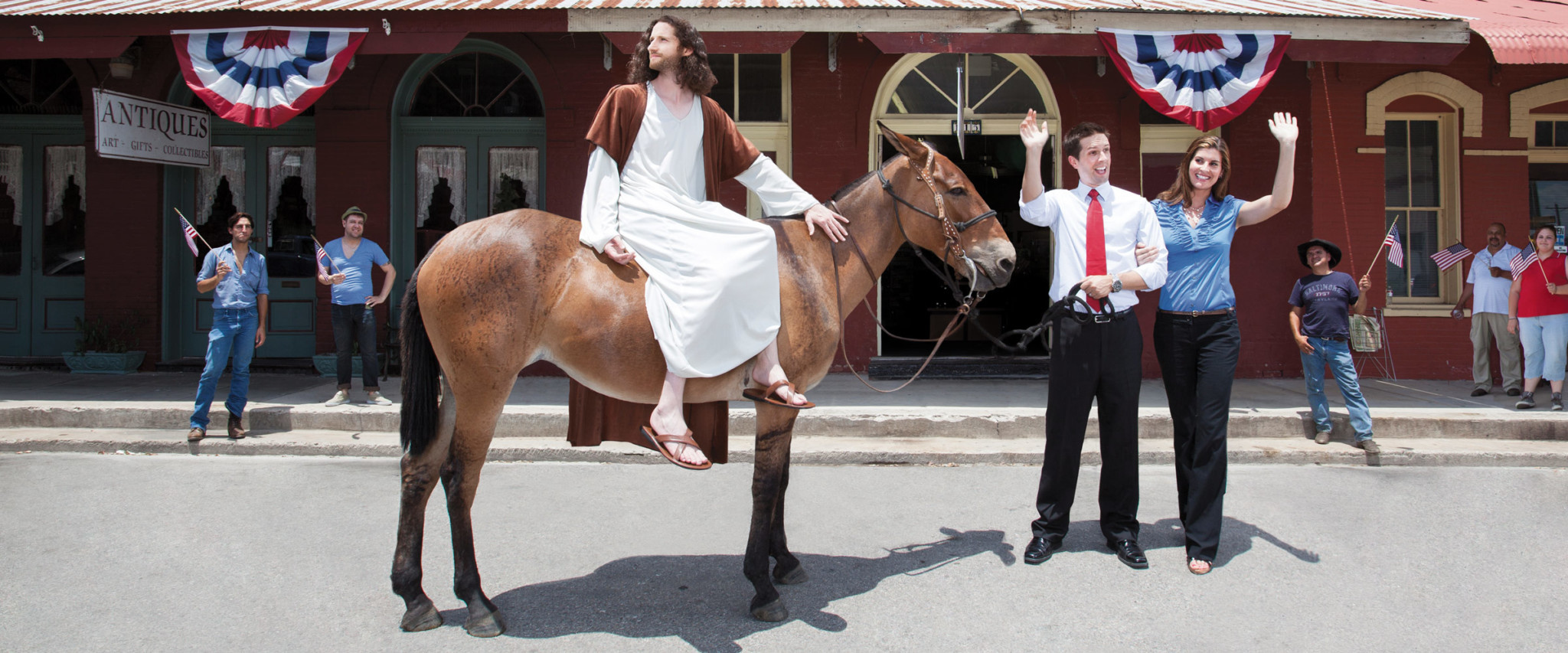On November 19, 2011, with the Republican presidential candidates in the heat of debate season and preparing for primaries, six hopefuls gathered in an evangelical church in Des Moines, Iowa, for an event called the “Thanksgiving Family Forum.” Hosted by The Family Leader, an Iowa evangelical group, the event was billed as a “family discussion” and featured the candidates sitting around what resembled a dinner table, decorated with seasonal garnish. The group’s vice president, Chuck Hurley, opened the proceedings by offering the assembled mass of around 3,000 a (slightly modified) quote from the father of the American dictionary and early patriot, Noah Webster: “It is alleged that religion and morality are not necessary qualifications for political office. But the Scriptures teach a different doctrine. They direct that rulers should be able men, such as fear God, men of truth, and men who hate bribes.” Hurley continued, “Let us ask God in tonight’s forum and in the days ahead to … help show us who that best person is.”
The discussion that followed featured various declarations of piety. U.S. Rep. Michele Bachmann of Minnesota assured the crowd that her “view of the world is a biblical worldview,” telling them the story of how she “gave [her] life over to the Lord” at age 16. Former Texas Governor Rick Perry noted that he’d been “driven to my knees multiple times as the governor of the state of Texas, making decisions that are life-and-death. … The idea that I would walk into that without God Almighty holding me up would scare me to death.” And former Pennsylvania Sen. Rick Santorum offered this reflection on abortion: “We have civil laws [in America] but our civil laws have to comport with the higher law … and that’s why, with the issue of abortion, as long as abortion is legal—at least according to the Supreme Court—we will never have rest because that law does not comport with God’s law.”
If there were any doubt about the pivotal role that the Christian religion plays in modern American politics, this event was a stark confirmation of it. But more than reaffirming the political reality that elected officials have to appeal to religious voting blocs to win, it also offers a clear look at how religious organizations like The Family Leader see their role in the political process. As the group’s president, Bob Vander Plaats, told the assembled crowd that night, it is their duty as Christians to do so. “For people of faith to remove their voice from the public policy process is spiritual negligence,” he said.
This, then, is one way in which religion guides the modern political ecosystem: Candidates appeal to churchgoers with their faith; churchgoers appeal to candidates and lawmakers with their faith-based needs; and preachers ask for divine counsel to choose the right candidates. In short, for anyone seeking to win a modern presidential election, it helps to have Jesus on your side.

THE MESSAGE
The roots of the religious political campaign in America can be traced back to almost the very beginning: 1800, the year of the country’s second contested presidential election. Thomas Jefferson’s campaign was plagued by attacks from Federalist supporters who questioned his Christian beliefs, with one church leader going as far as to accuse Jefferson of “disbelief of the Holy Scriptures.” “It was Jefferson’s campaign that really exposed these religious voting blocs,” says Paul Djupe, associate professor of political science at Denison.
The mixing of politics and religion goes back even further. Longtime Professor of Religion David Woodyard ’54 says there has been a consistent background message in American political rhetoric that began even before the country started electing presidents. He traces it back to 1630, when Puritan leader John Winthrop famously told his fellow settlers that they were special: “For we must consider that we shall be as a city on a hill,” Winthrop said, employing a reference from the Sermon on the Mount, one of Jesus’ most famous addresses. Winthrop continued, “The eyes of all people are upon us.” This image has since been evoked by politicians from JFK to Reagan, and Woodyard says it exemplifies a consistent historical religious understanding—that America is the beneficiary of a God-granted exceptionalism. “That is the background that enables [politicians] to use God talk to advance their agendas,” he says.
And God talk works. In 2006, David Kuo, a former deputy director of the Office of Faith-Based and Community Initiatives in the George W. Bush White House, wrote Tempting Faith: An Inside Story of Political Seduction, which revealed that Bush speechwriters employed quotes from popular evangelical parables and lines from hymns to covertly cue evangelicals. “This was an explicit strategy to appeal to evangelicals,” says Djupe, who decided to test its efficacy. He and a colleague set up a series of experiments with student volunteers, presenting them with a short statement from a hypothetical candidate. A statement included a few of the coded messages used by the Bush administration. Djupe and his colleague found that evangelical participants typically reacted favorably to the statements, indicating a higher likelihood of voting for the candidate. “It established that trust [among evangelicals],” says Djupe. “They assumed that [the candidate] is a good conservative; that he will do the right thing.” Catholics and mainline Protestants, however, were unaffected. Which, says Djupe, is exactly how it is supposed to work—attracting evangelicals while leaving the rest unoffended if unmoved.
Covert as the Bush White House may have been in this particular operation, the president was typically more direct. Famously open about his born-again background, Bush employed his relationship with God in unfortunate ways in Woodyard’s view. “Bush took his private religiosity and piety and used it to justify his political instincts,” says Woodyard, noting disputed reports that Bush told Palestinian officials in 2003 that God told him to invade Iraq. He saw this same approach on display during this year’s Republican primary debates, which he said were filled with statements of “bankrupt religiosity.”
Associate Professor of Communication Jeffrey Kurtz also notes that these kinds of declarations of faith are too often used as a wedge by politicians. “America is a pluralistic country—including both those of faith and those not of faith,” says Kurtz. “But today when faith walks onto the public stage, it does so to divide people.”
Whether or not it is divisive and bankrupt, cranking up the piety too high may turn off voters. A March poll conducted by the Pew Research Center found that 38 percent of Americans believe there has been “too much expression of religious faith and prayer from political leaders”—a sharp uptick from Pew’s 2001 polling, which found only 11 percent of Americans believed the statement. (The trend appears to be bipartisan, too, with both Republican and Democratic voters showing a similar increase in distaste for public displays of piety.)
The churches themselves might also feel a backlash. In an article in the March/April edition of Foreign Policy, researchers from Harvard and Notre Dame found that the numbers of young people who claim no religious affiliation is increasing rapidly. There has long been a consistent portion of the American population in this category, usually somewhere between five and seven percent, but by the mid-1990s, it was 12 percent. By 2011, it was 19 percent. Just between 2006 and 2011, the author’s survey found that “a third of Americans in their early 20s were without religion, compared with a quarter of those who were that age when we surveyed them in 2006.”
What is behind this religious de-affiliation? The researchers argue it has to do with the way the religious right has co-opted conservative politics. “Politically moderate and progressive Americans have a general allergy to the mingling of religion and party politics. And millennials are even more sensitive to it, partly because many of them are liberal (especially on the touchstone issue of gay rights) and partly because they have only known a world in which religion and the right are intertwined.”
Not all of the political outreach to religious voters comes from the stump. (And it doesn’t always come from Republicans.) Campaigns can have whole operations dedicated to faith communities. President Obama, for instance, employed faith-based advisors even as a senator. The Denver convention where Democrats would officially choose Obama as their presidential candidate featured a series of “faith caucus meetings”—the first of their kind at a Democratic convention. There were also direct appeals to different voting blocs. “We’re certainly not expecting to outright win the evangelical vote,” Joshua DuBois, director of religious affairs for the Obama campaign, told Bloomberg News in 2008. “We’re trying to make it more comfortable for religious folks who are more moderate or conservative to support Obama.” And after he got into office, Obama renewed—with some tweaks—his predecessor’s once-contentious office of faith-based initiatives. Today, the campaign has a “faith vote” operation and the president has a team of five spiritual advisors and a network of pastors and clergy that he relies on for guidance and outreach, just as his Republican predecessors leaned on the likes of Billy Graham.
Republican candidate Mitt Romney, who as a Mormon is courting an evangelical voting bloc that has historically been leery of his religion, gave the May commencement address at Liberty University, which was founded by preacher and evangelical leader Jerry Falwell. (A 2008 Harris poll found that 54 percent of evangelicals would be bothered by the idea of a Mormon president.) It’s no coincidence that one of the advisors leading Romney’s faith outreach previously served as an aide and spokesperson for Falwell.
Building those kinds of relationships can create expectations. Just two hours after he declared his support for gay marriage in May, Obama was on the phone with ministers across the country to explain his position and do damage control. Reports suggested that not everyone was excited about the change of heart. One exception: Ralph Reed, conservative activist and chairman of the Faith and Freedom Coalition. Hours after the announcement, he sent out an email to supporters and the press claiming the announcement was electoral gold for the Republicans. “This is an unanticipated gift to the Romney campaign. It is certain to fuel a record turnout of voters of faith to the polls this November.”

FAITH IN ACTION
Religious communities are not passive flocks waiting for a candidate to shepherd them. They are organized, often highly political entities lobbying for their particular worldview to be translated into public policy. For years, this space has been dominated by the religious right, which spent decades turning grass roots groups into a well-oiled political machine, communicating directly to faith voters and organizing them into the conservative movement and the Republican party. But in recent years, a new religious left has sought to redefine Christian politics.
David Woodyard argues that this fight for the face of faith is a struggle between empire—which he defines as any entity that attempts to impose its political, social, or economic will on others—and the true Christian spirit. In his recent book, The Church in the Time of Empire, he says the role of the church should be to subvert empire—not to cause chaos, but to act in opposition to imperialist goals. “The church reverses empire in that it lives from a failed life, announces forgiveness for the unforgivable, offers mercy to those who would need it whether or not they deserve it, and embraces the unembraceable with food, shelter, and acceptance, and a measure of hope for a new future,” he writes. “In a sense, the church has no fear of being seen as pathetic or without ‘the right stuff!’” An example of what this looks like in real terms, says Woodyard, is his local church’s consistent efforts to provide services for the hungry and the homeless and support and affirmation for same-sex relationships, all while sustaining a traditional ministry. “That is a community that sees opportunities for justice to be implemented in the world,” says Woodyard. In other words, the church needs to have more of a focus on helping those that Jesus sought to help—the sick, the afflicted, the outcasts—and less of a focus on aiding the powerful.
More and more, faith communities on the left are taking this concept and applying it to the world of public policy. Jennifer Butler, executive director of the nonprofit strategy center, Faith in Public Life, says her group aims to provide “a megaphone for all of those people who feel misrepresented by the Christian right.” A large part of the six-year-old operation is media: organizing a group of Catholic nuns to speak out against what they see as oppressive immigration measures, arranging for clergy to publicly protest Republican budget measures that they argue would cut benefits to the poor, and working with lawmakers to incorporate various messages in their communications. She says that their work in getting religious voices into the public square helped save President Obama’s healthcare reform initiative when it seemed to be on the ropes. “Faith leaders generally aren’t equipped to impact public debates,” says Butler. They may not be cognizant of the modern political system, where the news cycle can have drastic effects on policy debates. Butler explains with a simple mantra: “If it didn’t happen on TV, it didn’t happen.”
While Butler and Family Leader president Bob Vander Plaats approach their work from different perspectives, she agrees with him on the role of religious communities in politics: If people of faith remain silent as public policy decisions are made, they could be considered spiritually negligent. “At the heart of the strength of our democracy is the weighing in of many perspectives—whether they are secular, agnostic, or religious voices,” Butler says. “If we abdicate our perspective and voice in the public square, we’re compromising our democracy; if I’m not speaking up, I’m compromising the call to live out my values.”
The Rev. Ashley Goff ’94, one of David Woodyard’s former students and a pastor at Church of the Pilgrims, a progressive congregation in Washington D.C., says affecting the political conversation is part of her church’s mission. “We don’t want the world to transform us, we want to transform the world around us,” says Goff, whose church has been active in the Occupy movement, hosted “queer proms,” and held vigils to bring attention to the atrocities in Darfur, Sudan. “And there is a multitude of ways of doing that. Public policy is one; serving lunch to someone on Sundays is another.” There’s no other way to read the scriptures, she says, then as a call to move. “We have a job to do—to live out [Jesus’] beliefs. We have to have a voice; we have to take action.”
WATER TO WINE
While Butler and Goff might prefer more rapid change of the political spectrum, Djupe says that the conservative religious power still holds sway. “Look at the positions they forced Mitt Romney to take,” he says. As governor of Massachusetts, Romney was generally viewed as a moderate; his positions on cultural issues like abortion and same-sex marriage have moved sharply right since then. And Romney’s last real challenger in the primaries was Rick Santorum, a favorite of the Christian right. “Did they get their preferred candidate?” says Djupe. “No. But they still got their candidate.”
For now, at least. As stable as the religious right has been in its politics over the past few decades, Djupe’s research has found that voting blocs can dramatically shift positions on issues in response to leadership. Djupe started working on the topic after the National Association of Evangelicals’ 2004 announcement that the organization supported dedicating resources to environmental causes, including the study of global warming. It was a sea change for the group. Historically, evangelicals had been affiliated with the kind of pro-business interests in the Republican Party who were suspicious of climate-change science. Djupe saw the announcement’s potential to pry a platform from the clutches of partisan haggling and make it a universal mission. He decided to test whether such a dramatic shift would be possible. In an experiment, he presented a pool of about 1,000 people with a paragraph about an evangelical preacher who was reading scripture and had a divine conversion to environmentalism. But not every participant got the same paragraph. Half learned that the preacher was the head of a national evangelical organization; the other half were kept in the dark about his religious affiliation. Of those who were told about his association with the evangelical organization, half of those learned it came about as a spiritual conversion; the other half were not told how he changed his mind. Then all were asked whether they agreed or disagreed with the following statement: “The U.S. government needs to do more to address the issue of global warming.” Among many evangelical respondents, there was general skepticism—except for one group. The evangelicals who were told both that the preacher was associated with a national evangelical organization and that he had experienced a spiritual conversion saw increases in their support for global warming activism. As Djupe writes in the summary: “As pro-environmental stances are more often taken in authentic ways in local religious communities, we should see environmentalism grow within evangelicalism, which in turn should usher in a sea change in politics on the issue.”
In other words, things can change. In the divisive conflict between left and right and Christian and secular, there might be some possibility for resolution. It might just take some dedicated—and perhaps divine—leadership.
Dan Morrell is an editor and writer based in Boston.

